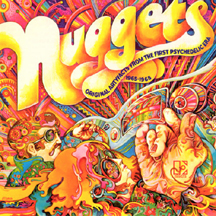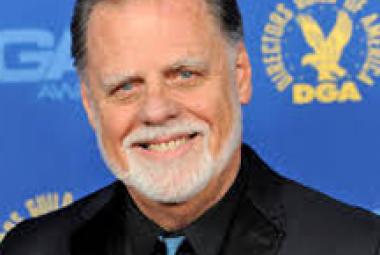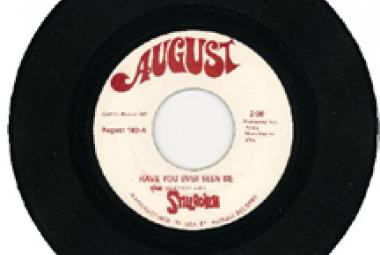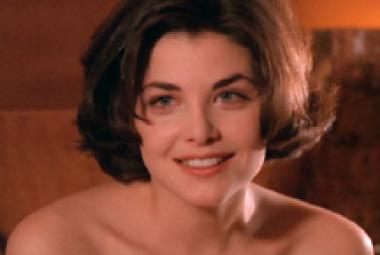NUGGETS: ORIGINAL ARTYFACTS FROM THE FIRST PSYCHEDELIC ERA, 1965-1968
Thirty-some years ago, I picked up a two-record set with a neo-psychedelic cover called Nuggets: Original Artyfacts from the First Psychedelic Era, 1965-1968. (I always just called it “Nuggets”, but Wikipedia uses the whole title). If the dates strike you odd – thinking, wait a minute, the Beatles’ Sgt. Pepper’s Lonely Hearts Club Band didn’t come out until the summer of 1967 – well, that is true; but psychedelia had been around a long time before that mainstream hit. (Likewise, by the time the Bee Gees, John Travolta and the Saturday Night Fever crowd showed up, the disco craze was on the wane). Besides being one of the greatest compilation albums of all time – Rolling Stone puts it at #196 on the 500 Greatest Albums of All Time period – this was a record on a mission: By naming “the first psychedelic era” just three or four years after it had ended, Nuggets helped ensure that there would be a second (and a third) psychedelic era.
Even before I played it the first time, I knew I would love it, because I was already familiar with a lot of these bands. In fact, I picked up the debut albums by Blues Magoos and the Electric Prunes in the same shipment from Columbia Record Club back when; and it wasn’t long before I also had the first album by the Shadows of Knight, with their killer cover of Van Morrison’s “Gloria”. The Seeds’ “Pushin’ Too Hard” was another favorite, though it was awhile before I got an album.
Lenny Kaye, who would later be the guitarist for Patti Smith Group, helped put the album together and wrote the liner notes that are almost as well known as the album itself. Patti Smith has been more or less a recluse all of her professional life – the whole time I was in NY, her only performance was a poetry reading that I passed on – but she has been getting a little more prominence lately, I am delighted to see: She interviewed Johnny Depp in the current issue of Vanity Fair magazine and has an acclaimed memoir out now called Just Kids, about her life with her late roommate, the brilliant and notorious photographer Robert Mapplethorpe.
In an introductory note, Lenny Kaye expressed something that I felt as well while I was reading it: that there was this wonderful music floating around among the British Invasion bands and the girl groups and the Motown sound, and it was gone before we even knew what we were hearing; and wouldn’t it be great to hear all of these songs again in one place. Kaye called the music “punk rock” – the first high-profile use of that term – but these days, it is called garage rock and psychedelic rock. It is no exaggeration to say that this album told my soul what kind of music I really love.
Reading between the lines, many of the songs were apparently chosen by what had hit the Top 100 at some point during that time period; that would explain the presence of the strangest of the songs, the closing track “It’s-a-Happening” by the Magic Mushrooms, which remarkably made it to something like #94 for a week. Even more intriguing to me were the songs that hadn’t hit the Top 100 at all. One immediate fave was “A Public Execution” by a Texas band called Mouse and the Traps (the song was officially issued under the name Mouse), doing something that I didn’t think would ever happen: someone else creating music along the lines of Bob Dylan’s “Like a Rolling Stone” and Highway 61 Revisited.
There about midway through the fourth side was a song that I didn’t think quite fit in: “Farmer John” by the Premiers. It was earlier than any of the other tracks, dating from 1964, and it sounded like it was recorded live at somebody’s picnic. The lyrics were simple – “Farmer John . . . I’m in love with your daughter . . . whoa-oh-oooh” – as was the beat and the slow, loping groove; but it just kept growing on me. Eventually Neil Young recorded a cover of the song in the same style on his excellent 1990 album Ragged Glory. The songwriter is Richard Berry – he is not related to Chuck Berry but has some seminal songs to his credit nonetheless; “Louie Louie” heads the list, but “Have Love, Will Travel” is almost as good. (See below).
(January 2011)
* * *
I’m not sure where I got the idea that “Farmer John” was written by Richard Berry, but I was mistaken about that; the song was actually written by Don “Sugarcane” Harris and Dewey Terry, who originally recorded the song in the mid-1950’s under the name Don and Dewey. Sorry about that. I’m still glad that I had something to say about Richard Berry though; he wrote some great songs, and not just “Louie Louie”.
(January 2014)















